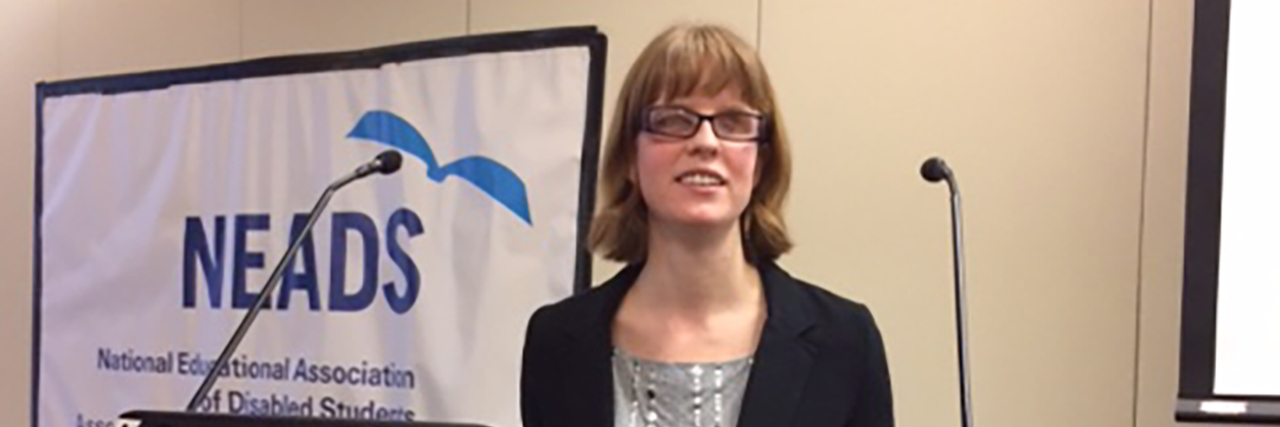The other night while sitting with my parents at dinner, the topic of smart devices came up. As my Apple watch buzzed to inform me of an incoming notification, I was reminded that it is polite to turn off one’s devices when eating, especially when visiting with the parents.
My parents are kind of old school. The idea that you can order a ride, acquire groceries, do your banking, or tell what color something is with the simple touch of an app is still new to them. I do believe in giving people your undivided attention when in social or professional situations. But the conversation with my folks really got me thinking about this whole notion of smart devices and how they are so much more to those of us living with disabilities than a way to play Words with Friends or check the latest Apple stocks (though I do that).
I started thinking about how my smart devices have opened my world, and how being without them is an access barrier. My phone can function as my eyes and my voice sometimes; there are not many hours in the day when I do not have Apple’s trusty Alex Voice from the VoiceOver settings reading me something or conveying a bit of information. So before you judge me for reaching for it, pause and ask yourself how you would feel if someone told you talking was bad for you, or reading was intrusive, or knowing the color of your shirt was excessive.
I’m going to challenge a concept that is meant to be helpful, but forgets a whole bunch of people: “unplugging.” When we put our phones and computers down, disconnect from email, text and social media and “be present,” we’re supposed to be able to pay more attention and improve brain function; there are a whole bunch of benefits supposedly attached to unplugging.
I use my phone and computer for a lot more than most people. Imagine being at a coffee shop, ready to pay for your morning brew and not being able to see the pin pad. Well thanks to Apple Pay, I just employ a simple tap of the Apple Watch and the coffee is mine! This same little tool vibrates on my wrist when I’ve set up the Apple GPS in a specific rhythm for right and another way for left, thereby ensuring I know where I am going on a city block. If I put my phone down, there goes my primary reading modality these days — Braille and speech. I use my iPhone and iPad coupled with my trusty Braille Edge 40 display to read, write, and be productive at work and in my personal life. I am sitting right now dictating this blog post into the Apple’s Siri function. Without my iPhone, iPad or Alexa, I am unable to independently read the newspaper (the Globe is my favorite), turn on and off the CBC (radio one or two), or order my ride-sharing service of choice.
Without my phone access to books or a computer under my fingers, I’m back to the stone age of hard copy Braille. My phone identifies clothing colors, reads food labels, gives me directions, and even can identify photos if taken correctly. So, if I “unplug,” away goes my access to a world of daily living tools and independence-offering solutions. I will be the first to admit that when my battery drops below 20 percent, I begin a desperate search for the nearest plug to charge in the phone or iPad. I carry an extra charger with me always and plan my morning routine to incorporate charging all my devices.
I’m mostly discussing the benefits of technology for those with visual disabilities, because that is what I know, but I’d be remiss if I didn’t mention how smart home technology can help those living with other disabilities. For example, I have a close friend who uses a power wheelchair, and she uses an application on her iPad or iPhone to control her chair. She is unable to physically turn a key to lock and unlock doors, so the August smart lock enables her to enter and exit her home. If that wasn’t enough, she is able to control lights, temperature, radio, and all manner of smart appliances by voice to make her that much more independent and able to live with grace and dignity.
So when you judge someone for being on their phone too much, or being too tied to technology, please pause first and think about how many people need that technology. By saying “It’s better to unplug,” you can make them feel bad about tools that offer them independence.

